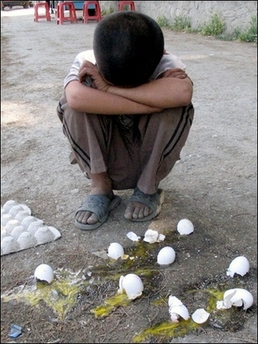Kabul's beggar children working the streets
(Agencies)Updated: 2007-06-08 14:19
KABUL - Shakir sits at the side of the road, his head buried in his hands, 10 broken eggs melding with the dust at his feet.
 Afghan boy Shakir with a tray of broken eggs in Kabul. According to surveys by the UN children's organisation, UNICEF, there are 50,000 to 60,000 street children in Kabul. [Agencies]  |
It is a routine the child has been playing out all over Kabul for months and now some residents are wise to it.
"He does this everyday," smiles a resident, handing the boy a chocolate bar as he walks past.
Each day Shakir invests the equivalent of a dollar to buy eggs that he drops on a dirty footpath. He then sits miserably in front of them and tells his story in the hope of attracting donations.
His brother, who looks about two years older, is never far away, ready to take the collection, fend off suspicious enquirers and chase away other street children also looking for some pickings.
Shakir's trick reflects the competitive world of child beggars in Kabul, a city clogged by a population of around four million people that exploded after the 2001 fall of the Taliban regime led exiles home and jobseekers to the capital.
According to surveys by the UN children's organisation, UNICEF, there are 50,000 to 60,000 street children in Kabul, said the UN Afghanistan spokesman Aleem Siddique.
Aschiana, a non-governmental organisation that supports and educates children working on the streets, puts the number higher and says it has almost doubled in the past two years.
"In 2005 there were 37,000 children working on the streets," said programme manager Nazar Mohammad.
"But now, according to new surveys, there's nearly 70,000 of them working," he says.
Most of them have lost one or both of their parents, often in the war that has long plagued this country, and are their families' only breadwinner, according to Afghanistan's Independent Human Rights Commission (AIHRC).
"A study carried out by AIHRC found a majority of 18,000 street children interviewed indicated that they have lost one or both of their parents," commissioner Nader Nadery says.
The children work alongside Kabul's adult beggars, who include men who lost limbs in the war and women hidden beneath filthy burqas and holding still infants to soften passing hearts.
Some of the children rap on the windows of cars stopped at traffic jams, demanding the occupants buy chewing gum, Dari-English dictionaries, maps in Russian or old copies of US military magazines.
Others cling to vehicles to wipe their windows with filthy rags; pretty little girls just smile and ask for tips.
Mohammad Aman trades on Afghan superstition by waving about a black and acrid smoke made by from burning "espand," the seeds of a wild plant. The smoke is believed to drive away evil spirits.
"My father died fighting the Taliban," says the grubby boy, aged 11. "We're six people at home," he adds, showing the number on coal-blackened fingers.
"Me and my brother have to work," says the child, dressed in rags and working on a busy road outside the upmarket shopping area of Shar-i-Nau. The boys make about four dollars a day - enough to buy food, he says.
Mohammad, from Aschiana, says the issue of street children has been neglected
amid the many problems facing the destitute country.
| 1 | 2 |  |
|
||
|
||
|
|